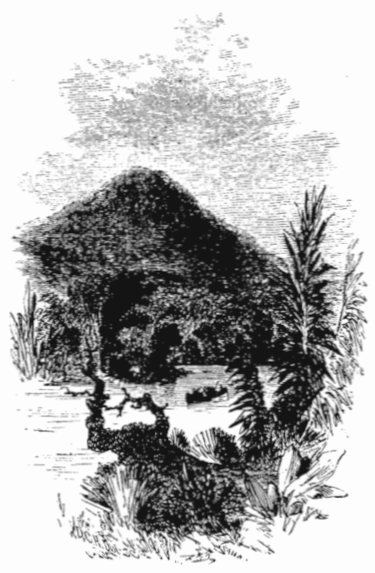the highest standard of morality in a frontier village in a wild country, but these people certainly carried the privilege of geographical position to an unjustifiable extent, and were, moreover, utterly devoid of the quality of personal courage, which is found elsewhere in similar situations.
"During my protracted journey in the wilderness, I had frequently, in the spirit which actuated Alexander Selkirk,[1] wished myself once more in a position to be cheated, and if I had selected from a minute map of the world, I do not believe that I could have had any wish so thoroughly gratified as at Yavisa.
"Our little canoes were laden to within a couple of inches of the water's edge, and as the tide turned soon after we left, we made slow progress, but after some four hours' hard paddling we arrived at the mouth of the river Tuyra of geographers, whence we ascended it about half a mile to Santa Maria, the residence of Mr. Lucre, where we were most hospitably entertained. As he had some medicines and ointment, our sores and boils were first treated; after which a pretty little woman, the daughter of the Jefe Politico, Mas Carinas, to whom Mr. Lucre was allied, in accordance with the custom of the country, prepared for us an excellent dinner, of which we partook thankfully. After dinner, finding that I could not be prevailed upon to pass the night, Mr. Lucre lent me his own canoe, and assisted by Mas Carinas and the Alcalde, I engaged three bogas on reasonable terms to convey me to Chapigana.
"At 5.30 we embarked, and I found that attention to my comforts had extended beyond the door of my hospitable entertainer, as a platform of boards was extended along the bottom of the canoe, upon which we could repose, as it appeared to us, luxuriously. Santa Maria de Real, as has been already mentioned, is about half a mile from the junction of the rivers Tuyra and Chuqunaqua, and contains, I should suppose, about six hundred inhabitants. The style of building is similar to that of the Indian Villages on the Caledonia, which we passed on the second day of our journey, although the houses are inferior in size and stability. Two small rivers enter at this village, and the houses are irregularly scattered along their banks, and that of the Tuyra. Large canoes trade between this place and Panama, where they exchange live stock, timber, and plank, for cottons, Delft-ware, cooking utensils, and cutlery. The village has no priest, and the incumbent of Yavisa performs service there as well as in Chapigana and two other villages, Molincea and Pinogana, which are situated on the Tuyra above Santa Maria. With a strong ebb-tide we paddled rapidly down the Tuyra to its junction with the Chuqunaqua, and thence down the united streams, which at this place becomes very wide, though it retains the tortuous character which distinguishes its whole length above Yavisa. At the junction there is a fine view of the Pine Mountain, which rises abruptly from the flat wooded plain which intervenes, to the height of some 2000 feet. After our long confinement in the forest, where our view was constantly limited by the forest growth, it was an intense pleasure once more to see high land and enjoy a distant view, and I thought I should never tire of gazing on this high and isolated mountain. Beyond it, I was informed, there formerly existed an Inca city, or as the natives term it, a City of the King, while on this side was, during colonial times, a Spanish town of considerable importance, which sprang up rapidly near the mines of Espirito Santo, and as rapidly decayed when the mine was closed by order of the King of Spain, after it was found to have attracted the cupidity of the English Buccaneers.

PINE MOUNTAIN.
"In the beautiful moonlight, and with an occasional glimpse of the Pine Mountain, we drifted and paddled until about 10 p.m., when meeting the flood-tide we tied up to a tree, and each of my bogas addressed themselves to sleep; with me the attempt was nearly a failure, as I suffered such intense pain from my boils and the wood worms (Guzanos de Monte), that until nearly morning I found sleep to be impossible. My two men, too, suffered from the same causes, and about midnight we abandoned the idea, and made a late supper on some boiled salt beef which I had prepared at Yavisa.
"At the same place, in anticipation of this journey, and with direct reference to our raven-
- ↑ "Better dwell in the midst of alarms,
Than reign in this horrible place."
